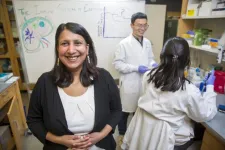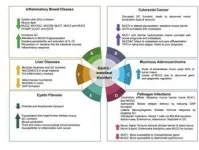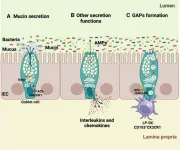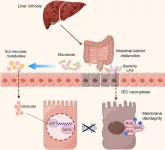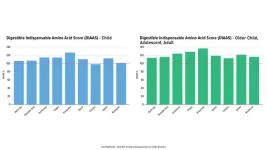By Benjamin Boettner
(BOSTON) — Ovarian cancer is more deadly than any other type of female reproductive organ cancer. It is estimated that in 2024, in the U.S. alone, more than 12,000 women will die from the disease because available therapies are not effective. To help overcome this striking deficit in women’s health, ARPA-H has selected a team at the Wyss Institute at Harvard University as an awardee of its Sprint for Women’s Health effort to develop “iNodes” – implantable lymphoid organs containing patients’ immune cells – as an entirely novel form of personalized immunotherapy to treat ovarian cancer.
The dismal outcomes of ovarian cancer are due to the fact that it is typically diagnosed at later stages of the disease: most early ovarian tumors are difficult or impossible to feel in pelvic exams and symptoms can also be caused by less serious conditions, including heartburn, indigestion, and constipation. At the time of diagnosis, about 80% of ovarian cancer patients have developed metastatic disease, and half of these women won’t survive the next five years.
iNodes are based on the important finding that the fortunate minority of ovarian cancer patients who survive the disease frequently develop lymph node-like structures known as “lymphoid organs” in their tumors. Functioning as newly formed immune command centers, these lymphoid organs reprogram the immune system to attack the tumor and retain a long-term immune memory of the tumor in case of its reoccurrence.
“To enable the treatment of ovarian cancer even at more advanced stages, we have developed implantable formulations of human lymphoid organs that could be injected at the operating table right after tumors are removed or directly inside the tumor if it cannot be removed. iNodes can then turn immunologically ‘cold tumors’ into ‘hot tumors’ by kick-starting an active anti-tumor response that sustains the fight against primary or metastatic tumors,” said Wyss Institute Senior Scientist Girija Goyal, Ph.D., who is the Principal Investigator on the iNodes project. “We are extremely excited about the ARPA-H support as it will tremendously accelerate our technology validation and translation into clinical stages and address a significant unmet need for women with ovarian cancer who lack effective treatments.”
Women’s health receives nine times less funding and thus suffers from a lower rate of innovation than health issues that affect men or children. Ovarian cancer in particular only receives 1% of the global investment into solid tumor R&D. ARPA-H launched the Sprint for Women’s Health to address critical unmet challenges in women’s health, champion transformative innovations, and tackle health conditions that uniquely or disproportionately affect women. The iNodes concept is supported through the Sprint’s “spark” track, which specifically focuses on early-stage research.
iNodes beginnings
Goyal and a team including Wyss Founding Director Donald Ingber, M.D., Ph.D., Lucas Barck, Pranav Prabhala and Sudip Paudel, Ph.D. embarked on the newly minted iNodes project in 2023. Before that the researchers had already supported their early idea to devise a method to create lymphoid organs in vitro by combining biomaterials with immune cells as a 1st year Validation Project. They demonstrated that the immune structures could activate lymphocytes and eliminate immunologically active human lung cancer cells in laboratory assays. Their findings brought Goyal and the team to the key question of whether they could create injectable lymphoid organs or nodes (iNodes) for therapeutic purposes. They successfully secured Validation Project funding for a 2nd year for this therapeutic pivot, and demonstrated that injecting human immune cells mixed with extracellular matrix proteins directly into human tumor masses in mice caused lymphoid organs to form within the tumors.
“Goyal's iNode concept emerged out of her earlier work developing a Lymph Node Chip as part of our long-standing human Organ-on-a-Chip development effort. Driven by the urgent need for new therapies to treat cancers specifically affecting women, she quickly focused the team on ovarian cancer. The ARPA-H Sprint for Women’s Health came at exactly the right time and seemed a wonderful fit for advancing a new type of personalized immunotherapy for this devastating disease,” said Ingber, who is also the Judah Folkman Professor of Vascular Biology at HMS and Boston Children’s Hospital, and the Hansjörg Wyss Professor of Biologically Inspired Engineering at Harvard School of Engineering and Applied Sciences.
iNodes for patients
In the ARPA-H-awarded project, the team will de-risk iNodes for ovarian cancer by testing their ability to shrink tumor masses in mice carrying human ovarian tumors, and combining them with other forms of immunotherapy, including immune checkpoint therapies that by themselves have not yet shown the desired efficacy in patients with ovarian cancer but could synergize with iNodes to enhance their effects.
“We envision that patients with ovarian cancer could be asked to bank their immune cells ahead of surgeries through simple procedures that are available at most medical centers. iNodes can be created in a short time and injected at tumor sites where they develop into lymphoid organs in a matter of days or a few weeks, instead of the years that natural lymphoid organs can take to develop. This would enable the immune system to be instantly activated against tumors or residual tumor cells to fight recurrence,” said Goyal.
Goyal is joined on the iNodes team by Sudip Paudel, Ph.D., a Postdoctoral Fellow involved in de-risking and further validating the technology; Research Technician Abdul Isaacs; Gretchen Fougere, Ph.D., the Wyss Institute’s Business Director – Healthcare, who focuses on Women’s Health; as well as Samuel Inverso, Ph.D., the Institute’s Director of Business Development – Partnerships.
“We believe the iNodes project has the potential to produce an effective and relatively inexpensive solution in the fight against ovarian cancer that could face far fewer hurdles than the complex manufacturing of other personalized cell therapies. It also is a shining example of how we are extending the reach of the burgeoning Women’s Health Catalyst here at the Wyss Institute,” said Ingber.
Media contact
Benjamin Boettner, Ph.D., Wyss Institute, Benjamin.Boettner@wyss.harvard.edu
###
The Wyss Institute for Biologically Inspired Engineering at Harvard University (www.wyss.harvard.edu) is a research and development engine for disruptive innovation powered by biologically-inspired engineering with visionary people at its heart. Our mission is to transform healthcare and the environment by developing ground-breaking technologies that emulate the way Nature builds and accelerate their translation into commercial products through formation of startups and corporate partnerships to bring about positive near-term impact in the world. We accomplish this by breaking down the traditional silos of academia and barriers with industry, enabling our world-leading faculty to collaborate creatively across our focus areas of diagnostics, therapeutics, medtech, and sustainability. Our consortium partners encompass the leading academic institutions and hospitals in the Boston area and throughout the world, including Harvard’s Schools of Medicine, Engineering, Arts & Sciences and Design, Beth Israel Deaconess Medical Center, Brigham and Women’s Hospital, Boston Children’s Hospital, Dana–Farber Cancer Institute, Massachusetts General Hospital, the University of Massachusetts Medical School, Spaulding Rehabilitation Hospital, Boston University, Tufts University, Charité – Universitätsmedizin Berlin, University of Zürich, and Massachusetts Institute of Technology.
END
